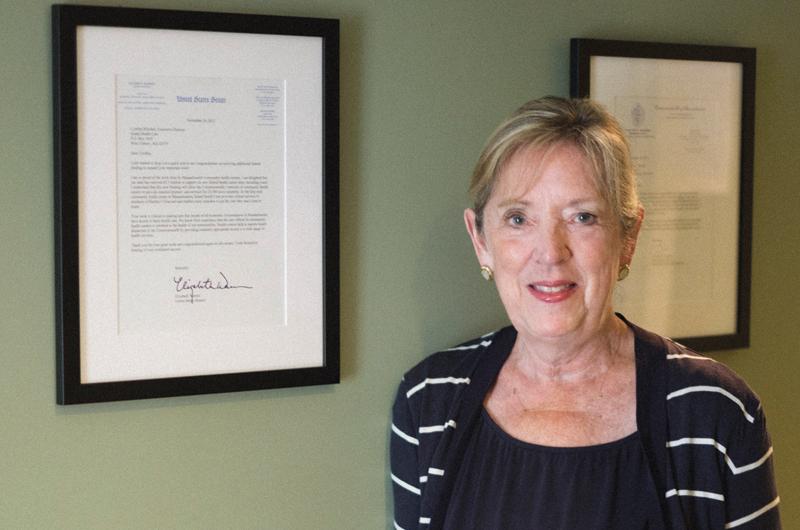Located in the maze of the Edgartown Triangle, Island Health Care (IHC) is a gem that is easy to miss. Unless, that is, you’re one of the 4,000 Islanders – roughly 25 percent of the Vineyard’s estimated year-round population – who depend on this nurse practitioner model of health care. In other words it’s difficult to imagine where Vineyard health care would be without IHC, given our seesaw population swings, cultural diversity, income disparity, and chronic physician shortages.
The mission, which is to serve everyone regardless of ability to pay, hasn’t changed since its founding in 2004 as the first rural health clinic in Massachusetts. Today IHC is a federally qualified health center, part of a nationwide program that serves more than twenty-five million Americans at 9,000 sites. That designation, and the resulting $1 million in annual funding, has enabled IHC to triple its staff and contract with other Island organizations for services such as mental health counseling, public insurance enrollment, and oral health.
It’s also helped make possible a new pediatric practice, so that IHC can now care for the health and well-being of every family member.
“We exist because we made the case to the federal government that this is a service area that is underserved, and has a population that is low to moderate income and otherwise could not afford health care,” says CEO and founder Cynthia Mitchell of West Tisbury. “We’ve never advertised, because from the moment we opened our doors we have had clients and steady growth,” she adds. “The only thing that limits us is space and we maximized what we have by working twelve hours a day Monday through Thursday and all day Saturday.”

In 2016 there were 10,000 visits, and the clinic is on track to hit 12,000 this year, all in a space that’s just 1,000 square feet. In addition to the medical staff, every hour the clinic is open there is a Portuguese interpreter on site, and Mitchell estimates Brazilians make up about 20 to 25 percent of the patient roster. According to Juliette Fay, the executive director of Martha’s Vineyard Community Services (MVCS), who credits Mitchell with both the vision and the tenacity necessary to create what she calls “a spectacular resource for the Island,” the clinic’s success serving non-English speaking clients inspired MVCS to make all of their programs bilingual.
Judy Jones, the clinic’s medical director, arrived on Island four years ago, just as the organization was ramping up following its health center designation and funding. There are now same-day appointments, which accommodate both the acute needs of visitors as well as regular clinic patients.
“It’s based on a primary care model,” Jones says. “It’s changed the whole culture of community health centers, where we can handle urgent needs and our patients as well. And bringing in a pediatric practice has helped us develop as a true community health center where we can see whole families. It changes the vibe and team members enjoy having kids here.”
New, too, is a contract with the Dukes County Jail and House of Corrections. For those inmates without pre-existing primary care, the clinic sees patients onsite at the jail. “It’s so important,” Jones says, “because the population often has issues, many of them around substance abuse or HIV status or infectious disease. This gets them back into primary care, and by meeting and connecting with the inmate in jail it helps them to show up for follow-up care once they’re out.”
Back at the Triangle, the day starts long before the first patient walks through the door with a morning huddle to discuss the needs of every patient scheduled to be seen. Do they need blood work, did they have a referral, do they need a colonoscopy or mammogram? As Jones says, the result is a plan for every patient appointment. Efficiency is a necessity given that the clinic sees as many as fifty patients a day.
Efficiency doesn’t mean impersonal, however. One patient who appreciates the IHC and Jones in particular is seventy-five-year-old Jacqueline Robinson, a retired nurse who got stuck in the Island doctor shuffle. “I was very happy when I met Judy Jones because she told me she could do everything except surgery and I appreciate that as a nurse. I know that if something important happened, she would take care of me.”
For her part, Mitchell always knew that germ of an idea fourteen years ago would blossom into a vibrant health center with thirty staff serving one-quarter of the Island. “The need in the community combined with the health center program model was always a perfect fit,” she says. “It just took time and it was no small matter to put the case forward and document it in the myriad of ways the feds require it, but we finally got there.”
When Mitchell is not at the Triangle clinic, she can be found at the West Tisbury Town Hall where she has been a selectman for nearly twenty years. But the thought of stepping down or stepping back at sixty-eight years old is anathema to her.
“It’s different now,” she says about the health center. “So even though I put in the same number of hours, it’s qualitatively different. I love the job. I’m at an age where people ask me how long will I keep going and my response is it’s my dream job now. I don’t want to stop. They’re going to have to carry me out. I’m as energized as I ever was and I believe it.”




